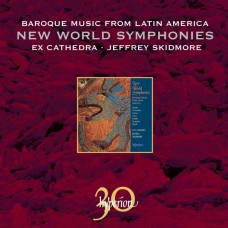|
Following the discovery of the Americas, Christianity and the Roman Catholic Church was established with incredible speed. Many of the Native Indians were part of highly sophisticated civilizations, most notably the Aztecs and the Incas, and were very responsive to the new ideas, especially music, which was already an important social and spiritual element in their lives. A staggering amount of music was subsequently created which, surprisingly, still remains little explored in today's global age.
This disc showcases some of the treasures from this important era in history, and includes works sung in Quechua (the language of the Incas) and Nahuatl (the language of the Aztecs). Works such as Padilla's remarkable Missa Ego flos campi have elements of flowing polyphony from Old Spain combined with lively, often syncopated, short phrases reflecting New Spain. The instrumentation on this disc is also mesmerizing—many different instruments were used extensively, including recorders, chirimias, cornetts, sackbuts and bajons, frequently used to double or replace voices.
In the words of the conductor, Jeffrey Skidmore, this fascinating disc spanning the late 16th, 17th, and early 18th centuries is “an inspiring beginners' guide to Baroque music and a spiritual devotion that has a relevance and function as important today as in the brave New World of South America all those years ago”.
1. Hanaq pachap kusikuynin, ritual music for chorus & ensemble
2. Missa Ego flos campi: Kyrie
3. Missa Ego flos campi: Gloria
4. Xicochi, xichochi conetzintle (Gently sleep, precious little one), for chorus
5. Missa Ego flos campi: Credo
6. Los coflades de la estrella (The brotherhood of the star), for chorus
7. Missa Ego flos campi: Sanctus
8. Versa est in Luctum
9. Missa Ego flos campi: Agnus Dei
10. Salve Regina
11. Qhapaq eterno Dios (Apostles' Creed) (Symbolo Catholico Indiano, 1598)
12. Ut queant laxis (polyphonie, plain chant)
13. Missa San Ignacio: Kyrie
14. Missa San Ignacio: Gloria
15. Convidando esta la noche, for chorus & ensemble |
|


